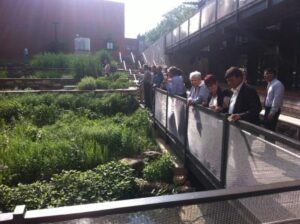Despite the realities faced by many regions of the world today–record droughts, increased water scarcity, aging stormwater infrastructure and related pollution–many of us still take water for granted. When we need it, we turn on a faucet, pipes bring it in, and when we’re done, it drains down a pipe and out of our minds. Unfortunately, this same mindset is reflected in many of the communities, buildings, and landscapes we humans have planned, designed, and built. In so many of these places, water is thought of last. Is all this about to change?
David Sedlak, author of the book Water 4.0 and co-Director of the Berkeley Water Center, believes we’re on the brink of a fourth revolution in the way people manage water. A big part of this revolution, according to Sedlak and other experts, will be the implementation of “integrated water strategies.”

We define integrated water strategies as ways of handling water that integrate the built world with the natural environment, people with the broader community of living things, and ecological science with disciplines like architecture, planning, landscape architecture, engineering, plumbing, and construction.
In addition to David Sedlak, we chat with renowned human rights activist and best-selling author Maude Barlow, the woman many say is responsible for getting water recognized as a fundamental human right. Paula Kehoe, Director of Water Resources for the San Francisco Public Utilities Commission, talks about diversifying the water portfolio of a major city in a drought-plagued state. Brian Richter, Director of Global Freshwater Strategies for The Nature Conservancy, shares his insight and some inspiring stories of water well managed.
Michael Ogden, engineer, water visionary, and founder of Natural Systems International (which ultimately became part of Biohabitats), spent more than 40 years helping communities use inspiration from nature to address water pollution problems. In his article The Ethics of Water, he shares that perspective and asks some deeply compelling questions about our relationship with water…and our downstream neighbors.
Katie Bohren describes a current project in Oregon’s Fernhill Wetlands, a place of Inspiration, Wonder, and….Wastewater Treatment.
In her editorial Unlocking Sustainable Water Management, Erin English calls for the removal of roadblocks that impede progress in implementing integrated water strategies.
We share resources related to water and integrated water strategies, as well as the latest news at Biohabitats. We’re currently producing a video featuring examples of successfully applied integrated water strategies. Be sure to check Biohabitats’ Facebook page throughout the summer for your chance to see it!
Please let us know what you think about integrated water strategies by contacting us or commenting.

